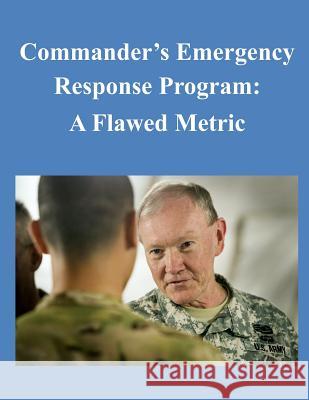Commander's Emergency Response Program: A Flawed Metric » książka
Commander's Emergency Response Program: A Flawed Metric
ISBN-13: 9781500530327 / Angielski / Miękka / 2014 / 62 str.
Throughout its military history, the United States has demonstrated poor institutional memory resulting in a tendency to reinvent the wheel. The development of counterinsurgency doctrine in Vietnam, for instance, yielded valuable knowledge about combating an irregular enemy. Regardless, the subsequent foray into a counterinsurgent environment during Operation Iraqi Freedom proved problematic as the U.S. scrambled to adapt to yet another asymmetric threat. Operationally, the selection of performance metrics by the U.S. in complex and adaptive battlefields has mirrored this argument. Throughout the entirety of Operation Iraqi Freedom, the U.S. spent over $60 billion on reconstruction and stability of which the Commander's Emergency Response Program cost the U.S. taxpayer over $4 billion. Reminiscent of the poor selection of performance measures in Vietnam, the metrics used to evaluate the effectiveness of the Commander's Emergency Response Program proved insufficient and resulted in the waste of time, money and resources. Adopting a combination of qualitative and quantitative analysis, this work examines various aspects of performance metrics and, ultimately, their affect on the Commander's Emergency Response Program. The work uses select historical cases to compare and contrast the selection of performance metrics in a conventional versus an irregular conflict. Empirical evidence is also used to test the effectiveness of metrics and their affect on outcomes. As a result of this analysis we learn that the selection of performance criteria is more difficult in asymmetric environments. As illustrated in the paper, the U.S. has wasted immense amounts of effort, and money, because poorly selected metrics are not always indicative of success. This fact, compounded by a lack of regulation and oversight, resulted in the Commander's Emergency Response Program providing questionable outcomes for military leaders. The United States has experienced many hard lessons due to its inability to institute historically developed best practices. It is vital that military commanders develop and implement metrics that are measurable and provide an accurate assessment of progress. Also essential is the need for regulation and oversight for funding programs to ensure their most efficient and effective use.
Zawartość książki może nie spełniać oczekiwań – reklamacje nie obejmują treści, która mogła nie być redakcyjnie ani merytorycznie opracowana.











